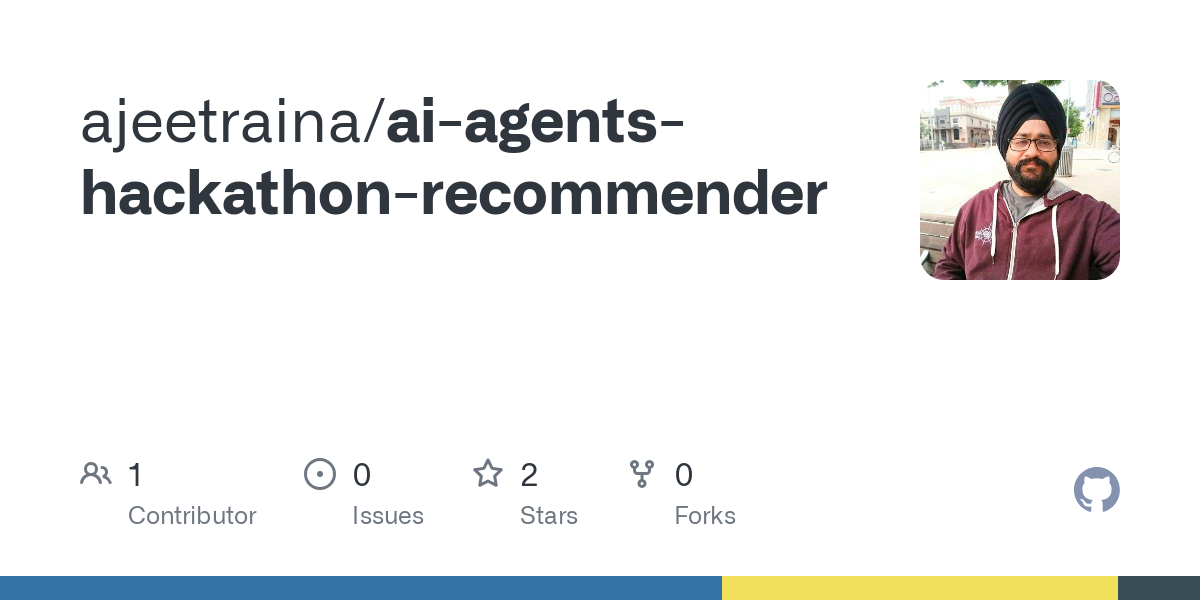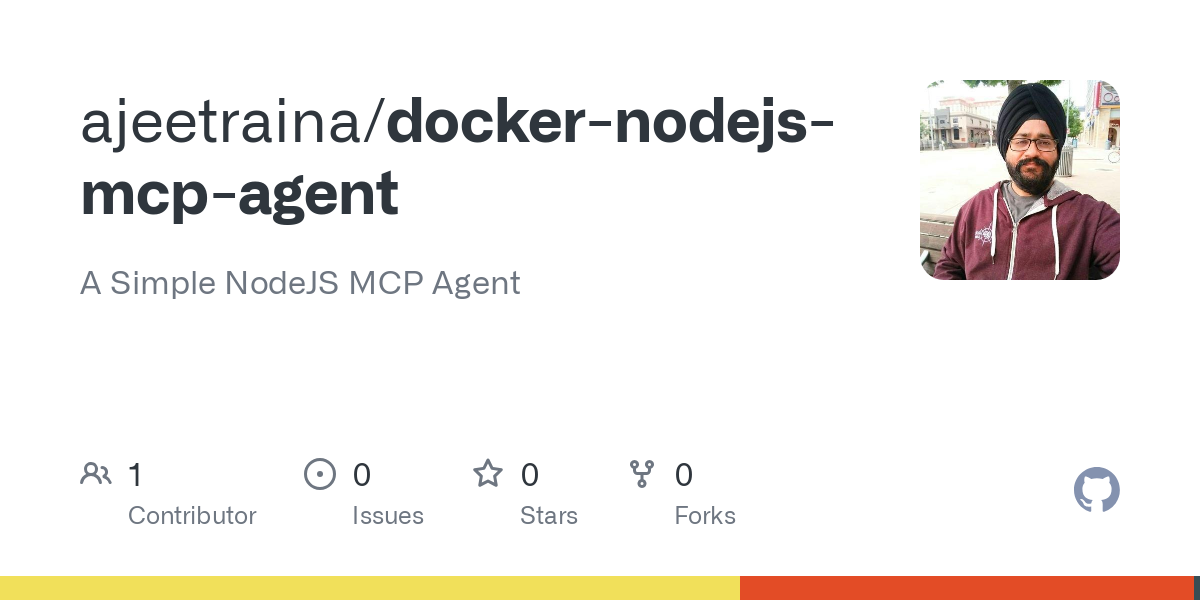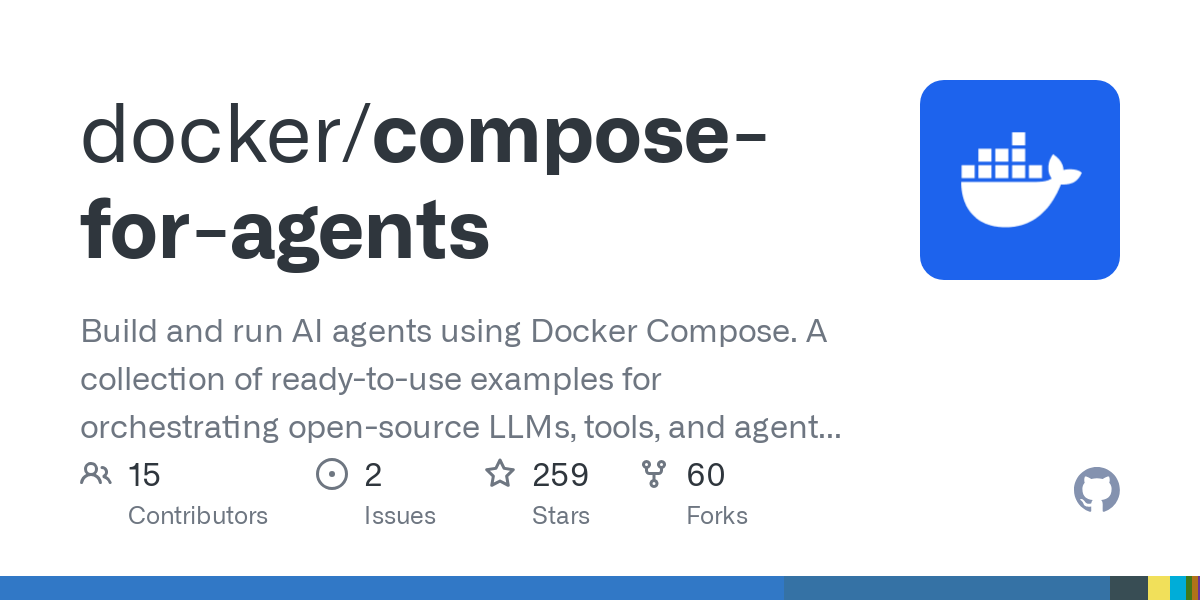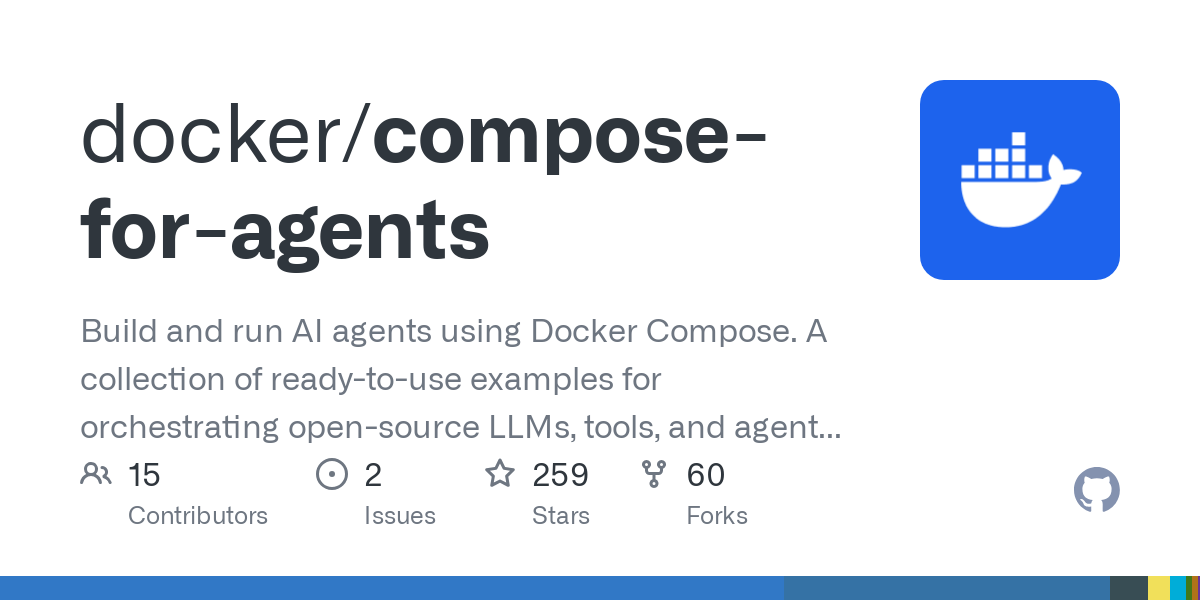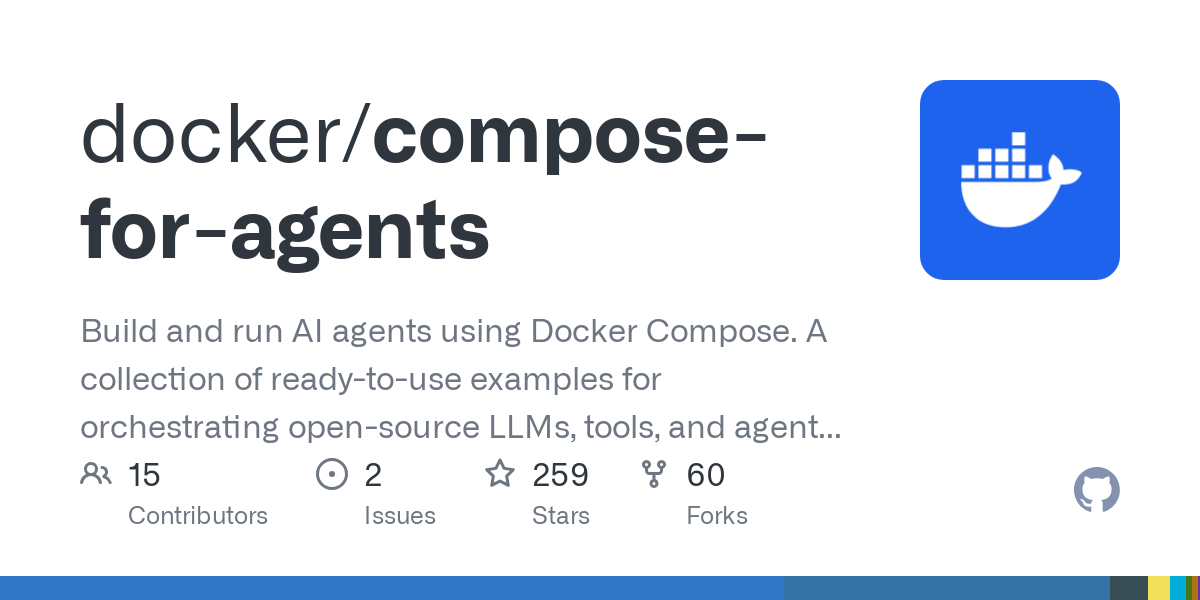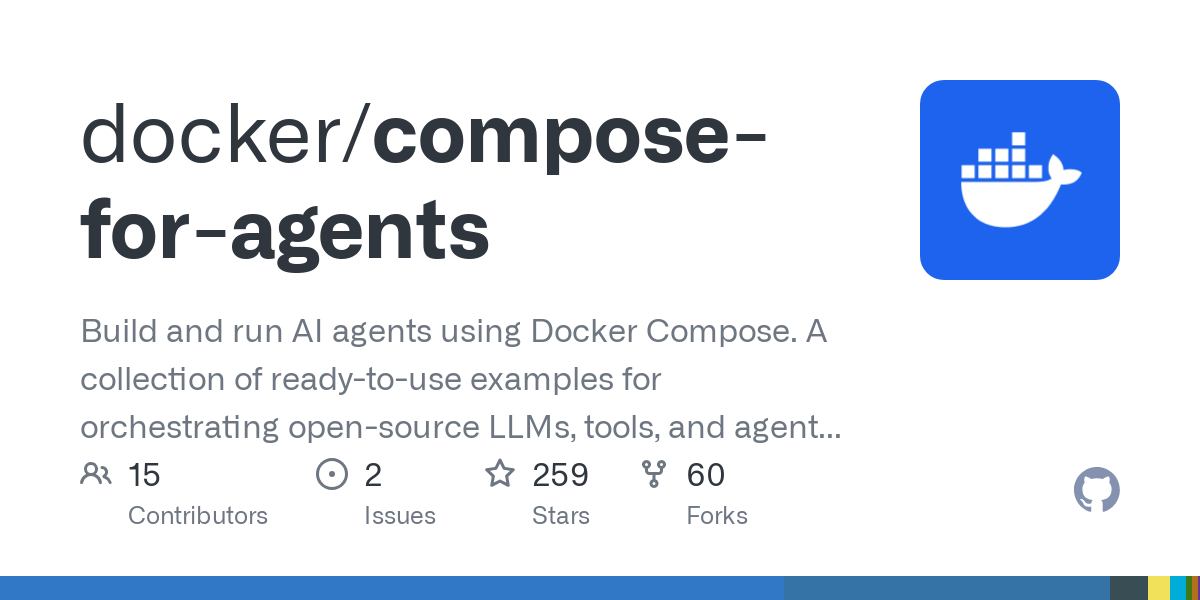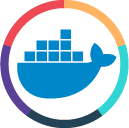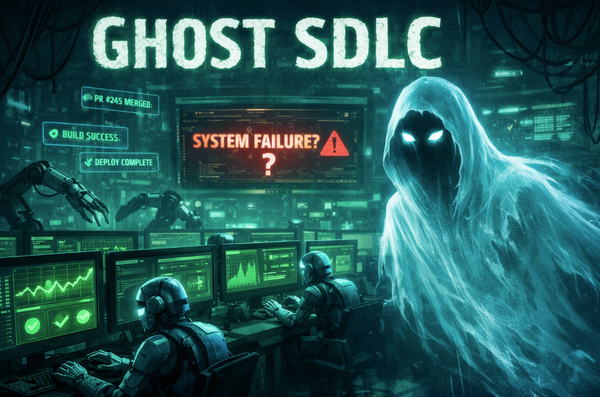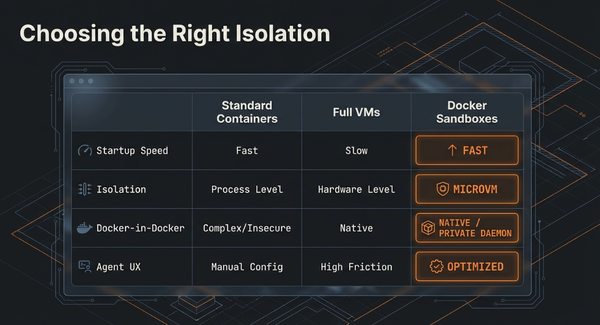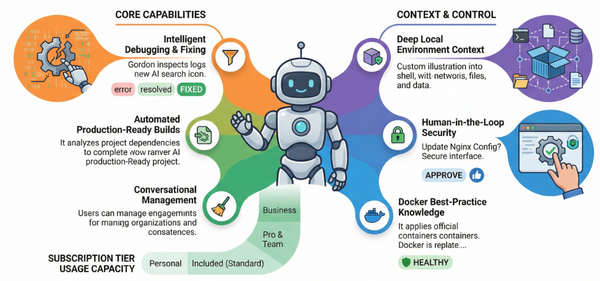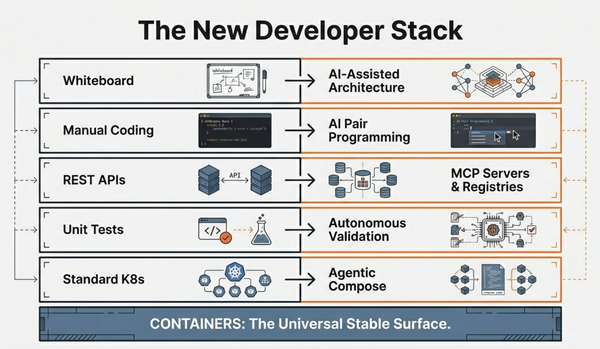How to Write Your First Agentic Compose File
Master Agentic Compose: The complete guide to Docker's new AI-native syntax. Learn models as first-class citizens, MCP Gateway patterns, secrets management, Docker Offload scaling, and advanced multi-agent architectures. Includes full working examples.
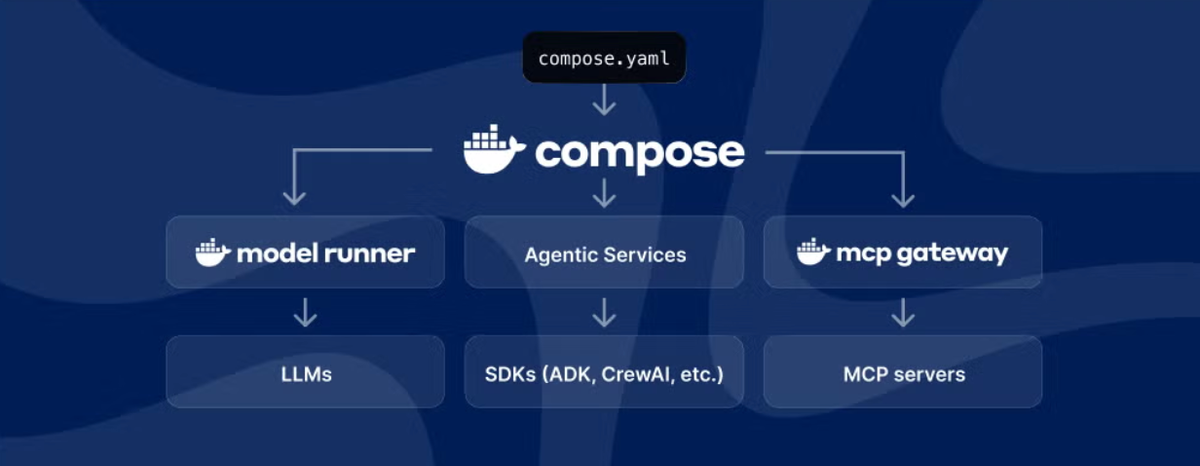
Docker Compose has evolved beyond traditional microservices to become the standard for defining and running agentic AI applications. With native support for AI models, MCP tools, and agent orchestration, you can now describe your entire AI stack in a single compose.yaml file.
This tutorial walks you through writing your first Agentic Compose file, covering the new syntax and patterns that make AI development as simple as docker compose up.

Understanding Agentic Compose Structure
An Agentic Compose file has six key sections:
services: # Your agent applications and infrastructure
models: # AI models as first-class citizens
secrets: # Secure credential management
networks: # Service connectivity
volumes: # Persistent storage
x-offload: # Production scaling configuration (optional)Let's build a complete example step by step.
Step 1: Define Your AI Models
Models are now first-class citizens in Docker Compose, not services. They define the AI capabilities available to your agents.
models:
# Small model for development
qwen3-small:
model: ai/qwen3:8B-Q4_0 # 4.44 GB
context_size: 15000 # 7 GB VRAM
# Medium model for production
qwen3-medium:
model: ai/qwen3:14B-Q6_K # 11.28 GB
context_size: 15000 # 15 GB VRAM
# Large model for complex tasks (Docker Offload recommended)
qwen3-large:
model: ai/qwen3:30B-A3B-Q4_K_M # 17.28 GB
context_size: 15000 # 20 GB VRAMKey Points:
- Models automatically integrate with Docker Model Runner
- Context size determines memory usage and capabilities
- Models can be referenced by name in your agent services
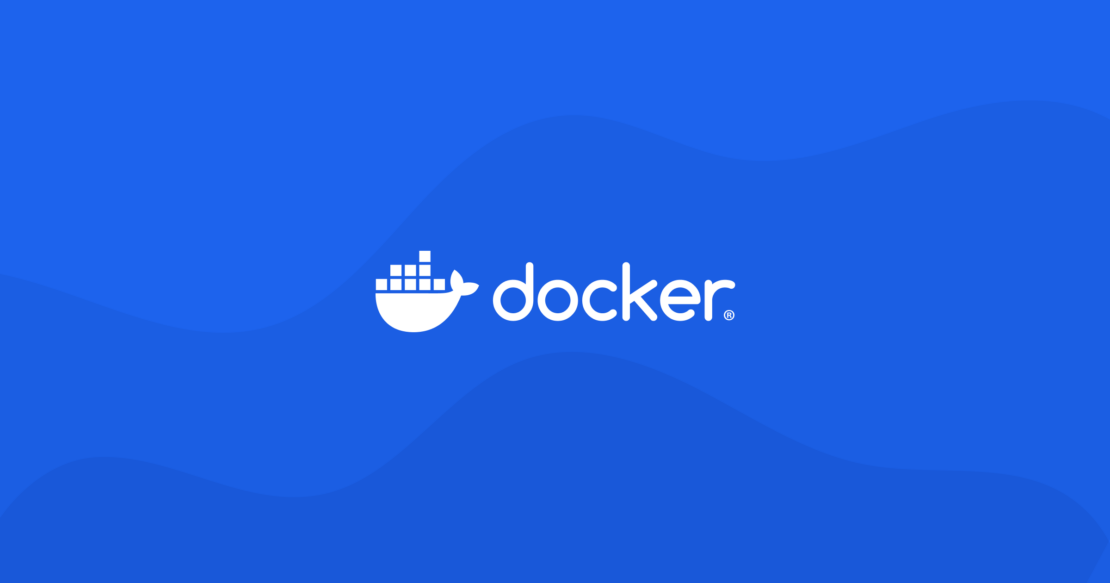
Step 2: Configure MCP Gateway
The MCP Gateway orchestrates all your AI tools and data sources. Instead of defining MCP servers as separate services, you configure them as command arguments.
services:
mcp-gateway:
image: docker/mcp-gateway:latest
ports:
- "8811:8811"
# Enable dynamic MCP server management
use_api_socket: true
command:
- --transport=streaming
- --port=8811
# Secure credential injection
- --secrets=/run/secrets/mcp_secret
# MCP servers to enable
- --servers=github-official,brave,wikipedia-mcp,filesystem
# Data transformation interceptors
- --interceptor
- "after:list_issues:jq '.results = (.results | map({number, title, state, user: .user.login, labels: [.labels[].name]}))"
- --verbose=true
volumes:
- /var/run/docker.sock:/var/run/docker.sock # For dynamic server management
- ./data:/app/data:ro # For filesystem access
secrets:
- mcp_secret
networks:
- ai-network
restart: unless-stoppedKey Features:
use_api_socket: trueenables dynamic MCP server provisioning--serversdefines which MCP tools are available--interceptortransforms tool outputs for better AI consumption- Secrets are injected securely at runtime
Step 3: Create Your Agent Application
Your agent service connects models to MCP tools, implementing the actual AI logic.
services:
research-agent:
image: my-research-agent
build:
context: ./agent
ports:
- "7777:7777"
environment:
# Connect to MCP Gateway
- MCPGATEWAY_URL=mcp-gateway:8811
# Agent configuration
- AGENT_NAME=research-assistant
# Link to AI models
models:
qwen3-small:
endpoint_var: MODEL_RUNNER_URL
model_var: MODEL_RUNNER_MODEL
volumes:
- ./agents.yaml:/config/agents.yaml:ro
depends_on:
- mcp-gateway
networks:
- ai-network
restart: unless-stoppedKey Points:
models:section links specific models to environment variables- Agents communicate with MCP Gateway via HTTP
- Configuration is externalized via mounted files
Step 4: Add Web Interface (Optional)
Create a user interface for interacting with your agents.
services:
agent-ui:
image: my-agent-ui
build:
context: ./ui
ports:
- "3000:3000"
environment:
- AGENTS_URL=http://research-agent:7777
depends_on:
- research-agent
networks:
- ai-network
restart: unless-stoppedStep 5: Secure Credential Management
Use Docker secrets instead of environment variables for sensitive data.
secrets:
mcp_secret:
file: ./.mcp.envCreate .mcp.env:
# GitHub access
GITHUB_TOKEN=ghp_your_personal_access_token
# Web search capabilities
BRAVE_API_KEY=your_brave_search_api_key
# Optional: External model APIs
OPENAI_API_KEY=sk-your_openai_api_key
ANTHROPIC_API_KEY=your_anthropic_api_keyBenefits:
- Credentials never appear in process lists
- Secure runtime injection into containers
- Easy rotation without rebuilding images
- Audit trail of secret access
Step 6: Define Infrastructure
Add supporting infrastructure for your AI stack.
networks:
ai-network:
driver: bridge
volumes:
model-cache:
driver: local
agent-data:
driver: local
conversation-history:
driver: localComplete Agentic Compose File
Here's the complete example:
services:
# MCP Gateway - Tool orchestration
mcp-gateway:
image: docker/mcp-gateway:latest
ports:
- "8811:8811"
use_api_socket: true
command:
- --transport=streaming
- --port=8811
- --secrets=/run/secrets/mcp_secret
- --servers=github-official,brave,wikipedia-mcp,filesystem
- --interceptor
- "after:list_issues:jq '.results = (.results | map({number, title, state, user: .user.login}))'"
- --verbose=true
volumes:
- /var/run/docker.sock:/var/run/docker.sock
- ./data:/app/data:ro
secrets:
- mcp_secret
networks:
- ai-network
restart: unless-stopped
# Research Agent Application
research-agent:
image: my-research-agent
build:
context: ./agent
ports:
- "7777:7777"
environment:
- MCPGATEWAY_URL=mcp-gateway:8811
- AGENT_NAME=research-assistant
models:
qwen3-small:
endpoint_var: MODEL_RUNNER_URL
model_var: MODEL_RUNNER_MODEL
volumes:
- ./agents.yaml:/config/agents.yaml:ro
- conversation-history:/app/history
depends_on:
- mcp-gateway
networks:
- ai-network
restart: unless-stopped
# Web Interface
agent-ui:
image: my-agent-ui
build:
context: ./ui
ports:
- "3000:3000"
environment:
- AGENTS_URL=http://research-agent:7777
depends_on:
- research-agent
networks:
- ai-network
restart: unless-stopped
# AI Models as first-class citizens
models:
qwen3-small:
model: ai/qwen3:8B-Q4_0
context_size: 15000
qwen3-medium:
model: ai/qwen3:14B-Q6_K
context_size: 15000
qwen3-large:
model: ai/qwen3:30B-A3B-Q4_K_M
context_size: 15000
# Secure credential management
secrets:
mcp_secret:
file: ./.mcp.env
# Infrastructure
networks:
ai-network:
driver: bridge
volumes:
model-cache:
agent-data:
conversation-history:Testing Production-scale Deployment
To test production-scale deployment with larger AI models, create compose-offload.yml:
services:
research-agent:
# Override with larger model for production
models: !override
qwen3-large:
endpoint_var: MODEL_RUNNER_URL
model_var: MODEL_RUNNER_MODEL
# Production environment settings
environment:
- MCPGATEWAY_URL=mcp-gateway:8811
- AGENT_NAME=research-assistant
- LOG_LEVEL=warn
- PERFORMANCE_MODE=true
models:
qwen3-large:
model: ai/qwen3:30B-A3B-Q4_K_M
context_size: 41000 # Increased for productionDeploy to production:
# Production with Docker Offload
docker compose -f docker-compose.yml -f compose-offload.yaml up -d
Benefits of Docker Offload for AI Development:
- Access GPUs - Move beyond local hardware constraints with one click
- Seamless cloud scaling - Test resource-intensive models with high-performance GPUs
- Stay in local workflow - No changes to your development process or tools
- Build, test, and scale - Complete AI development lifecycle from laptop to cloud
- Cost-effective testing - Only pay for GPU compute when you need it
Advanced Patterns
Multi-Agent Systems
services:
coordinator-agent:
# ... coordinator configuration
models:
qwen3-large: # Larger model for orchestration
endpoint_var: MODEL_RUNNER_URL
model_var: MODEL_RUNNER_MODEL
specialist-agent-1:
# ... specialist configuration
models:
qwen3-small: # Smaller model for specific tasks
endpoint_var: MODEL_RUNNER_URL
model_var: MODEL_RUNNER_MODELCustom MCP Interceptors
services:
mcp-gateway:
command:
# Transform GitHub issues to CSV
- --interceptor
- "after:list_issues:jq '.results | map([.number, .title, .state, .user.login] | @csv) | join(\"\\n\")'"
# Simplify web search results
- --interceptor
- "after:brave_web_search:jq '.results = (.results | map({title, url, snippet}))'"
# Add metadata to all responses
- --interceptor
- "after:*:jq '. + {timestamp: now, processed_by: \"mcp-gateway\"}'"Environment-Specific Configuration
# docker-compose.dev.yaml
models:
qwen3-small:
model: ai/qwen3:8B-Q4_0
context_size: 8000 # Reduced for development
# docker-compose.staging.yaml
models:
qwen3-medium:
model: ai/qwen3:14B-Q6_K
context_size: 15000
# docker-compose.prod.yaml
models:
qwen3-large:
model: ai/qwen3:30B-A3B-Q4_K_M
context_size: 41000 # Maximum for productionBest Practices
1. Model Selection Strategy
- Development: Use small models (8B) for fast iteration
- Testing: Use medium models (14B) for realistic evaluation
- Production: Use large models (30B+) with Docker Offload
2. MCP Server Configuration
- Start with essential servers:
github-official,brave,wikipedia-mcp - Add domain-specific servers as needed:
slack,notion,database - Use interceptors to optimize data for your agents
3. Secret Management
- Never put credentials in compose files
- Use
.mcp.envfor all API keys and tokens - Rotate secrets regularly via file updates
4. Resource Planning
models:
production-model:
model: ai/qwen3:30B-A3B-Q4_K_M
context_size: 41000
# Resource requirements (for planning):
# - Model size: 17.28 GB
# - VRAM needed: 24 GB
# - Recommended: Docker Offload5. Networking and Dependencies
services:
agent:
depends_on:
- mcp-gateway # Ensure MCP tools are ready
networks:
- ai-network # Isolated network for AI servicesDeployment Commands
# Validate your compose file
docker compose config
# Start development stack
docker compose up -d
# View all services
docker compose ps
# Check model status
docker compose exec research-agent curl http://localhost:8080/models
# Test MCP tools
docker compose exec mcp-gateway curl http://localhost:8811/mcp \
-d '{"jsonrpc": "2.0", "method": "tools/list", "id": 1}'
# Deploy to production with larger models
docker compose -f docker-compose.yml -f docker-compose.prod.yml up -d
# Scale specific services
docker compose up -d --scale research-agent=3What's Next
You now have a complete Agentic Compose file that defines:
- ✅ AI models as first-class resources
- ✅ Secure MCP tool orchestration
- ✅ Agent application logic
- ✅ Production scaling with Docker Offload
- ✅ Secure credential management
Next steps:
- Customize the agent logic for your use case
- Add domain-specific MCP servers
- Implement custom interceptors for data transformation
- Set up CI/CD for automated deployments
- Scale to production with Docker Offload
The future of AI development is declarative, containerized, and composable. With Agentic Compose and Docker Offload, you can build and test sophisticated AI agents—from laptop development to cloud-scale validation—all while staying in your familiar Docker workflow.
Sample Projects
